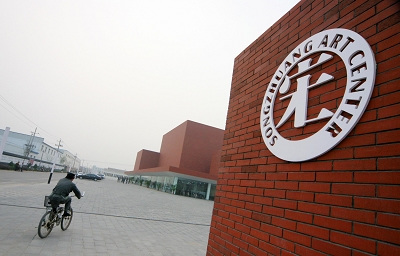(Ecns.cn)--Songzhuang Artist Village, located on Beijing's eastern outskirts in Tongzhou District, is a well-known community once considered a utopia by many Chinese artists. But as the capital city expands and more commercial interests invade, things are quickly deteriorating for the creative types who drew national attention to the village in the first place.
"More than one art gallery is being built right now in the village, but inside and around them other things like clothes are also being sold here. The place is no longer about art, but about real estate," said Li Xianting, a famous artist in China who is aggrieved by the current situation in Songzhuang.
Born in 1949, Li gained fame in the art circle very early in China. To many people, without him there would be no Songzhuang. "Songzhuang may gain great profit for the businessmen and villagers here, but the artists will not benefit from it," said Li, who now lives in Xiao Bao Village, located at the center of Songzhuang.
During the early 1990s, Songzhuang was no different from any other village in China, but when a group of artists who had previously congregated around the Old Summer Palace moved there in 1993, its fate began to change.
In the next decade, Songzhuang influenced and attracted many artists – rich and poor, famous and infamous – who came and settled down to pursue their creative dreams. Gradually, the village gained popularity and became a fashionable hub of art, as well as a gauge of creative success nationally.
It also attracted attention from the government. Five years ago, the village was among the first to gain the title of "culture creativity industry gathering area."
Moreover, Songzhuang has been listed as one of three "economic zones" in Tongzhou District, and its economic prospects have become more tempting to those with dollar signs in their eyes. "Cultural" industries engaged in animation, digital production and movies will all be invited to set up shop here, according to authorities.
"When construction is finished, Songzhuang will gain an annual production value of one billion yuan (US$156.84 million)," said a local official.
Inevitably, that prosperous economic future has brought an upsurge in housing prices and a decline in the quality of life for most artists here. Last year, Songzhuang held an art festival and Li made a speech at the opening ceremony, where he proclaimed that "though the festival may bring fame to the place and profit to the villagers, when it is finished, most common artists will gain nothing."
The reason Songzhuang initially attracted so many artists was its low cost of living. Artists could spend 5,000 yuan (US$784.1) to buy a courtyard home during the 1990s, for example, yet this is now a fairytale.
Since 2009, average housing prices in Beijing have increased by 70 percent, driving up rents accordingly. In 2007, painter Li Lin and his wife moved to Songzhuang from Anhui Province, hoping to realize their dreams, but the dramatic increase in rent nearly broke them.
In order to survive, Li's wife must peddle goods such as clothing and pirated CDs at a stall. The couple has a daughter to support, so there is little choice. "My dream right now is to be rid of this stall," said Li's wife.
Though there are artists who manage to live well in the village, the majority are struggling. Ten years is long enough to turn a man with creative passion into a middle-aged alcoholic, and at least one artist went mad and killed himself after failing to sell his work.
"I am sad about what has happened to some of the artists, and it is pity that we can do nothing to change it," said Li Xianting. The Songzhuang government used to take action to help mitigate the pressure brought on by the housing prices, but the huge wave of economic development has overwhelmed their influence.
In the past ten years, many villages in China got rich after gaining the support of the art industry, and Songzhuang is no exception. Famous artists have had a huge economic impact here, and even though some failed to realize their own dreams, the villagers all benefited from their efforts.
Tourism, real estate and other jobs have helped alleviate the job problem in Songzhuang. In 2010, the annual production value of Xiao Bao village was 400 million yuan (US$62.73 million), a large number for a village with a population of only 1,367 people.
But for Li, the prosperity of Songzhuang may just be a phase. "What the villagers gained did not come from their hard work, and since this place still lacks government and economic support, it will be hard it to build it up as a comprehensive art garden."


















